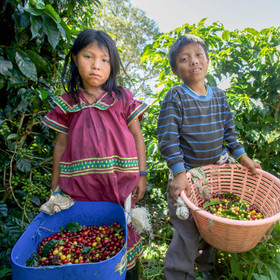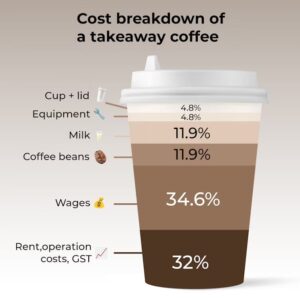Beware of Free Coffee – it Costs More than You Think!
In today’s economy, the allure of a free or cheap coffee is undeniable. Whether it’s a complimentary cup at a conference, a promotional giveaway, or simply opting for the least expensive brew, many of us have indulged without a second thought to the real cost. But what lies beneath the surface of that seemingly innocuous cup? What are the hidden costs, and who ultimately pays the price?
The Quest for Cheap or Free Coffee: Common Considerations
When seeking out inexpensive or free coffee, as customers we might ponder:
- Cost Savings: How much money can I save by choosing this option? Everyone loves a bargain, right?
- Quality: Does a lower price mean compromising on taste or freshness? No one likes a watery flavourless coffee.
- Convenience: Is this option readily available when I need it? It can be much easier to grab and go where you are than go looking.
- Ethical Implications: Am I supporting fair labour practices and sustainable sourcing? mmmm, how do we know?
While the first three considerations are immediate and personal, the fourth delves into a complex web of global economics, labour rights, and ethical consumption.
By being willing to pay more for our coffee, we support a system that values human rights, environmental stewardship, and economic fairness. It’s a commitment to ensuring that the coffee industry can thrive without exploiting its most vulnerable participants.
The True Cost of Coffee: Beyond the Price Tag
Paying a fair price for coffee is not just about covering the cost of beans and brewing; it’s about ensuring a sustainable livelihood for those who cultivate and harvest the coffee we cherish. The global coffee industry is fraught with challenges, many of which stem from the relentless drive to keep prices low.
Living Wages and the Plight of Coffee Farmers
In many coffee-producing countries, farmers and laborers struggle to earn a living wage. A study focusing on Honduras and El Salvador estimated that monthly household living wages were approximately US$459.12 and US$450.75, respectively. However, many coffee workers earn far less, leading to widespread poverty and insecurity.
The disparity between the wages workers receive and what is considered a living wage often forces families to make difficult decisions, including involving their children in labour to make ends meet. This not only deprives children of education and a carefree childhood but also perpetuates the cycle of poverty.
Child Labor: A Bitter Reality
Child labour remains a significant issue in the coffee industry. In regions like Brazil, studies have found that child labor rates are approximately 37% higher in coffee-producing areas, with children as young as six working long hours under hazardous conditions.
Here are some sites/references you might like to read further:
Recent investigations have also uncovered child labour on farms supplying major coffee brands. For instance, a 2024 report highlighted that coffee farms in China’s Yunnan province, supplying companies like Nestlé and Starbucks, were using child labour and subjecting workers to excessive hours under poor conditions.
The Illusion of Ethical Certifications
Many consumers rely on ethical certifications to guide their purchases, believing that these labels guarantee fair labour practices. However, reports have shown that even “ethically” certified coffee farms can harbour child labour and other unethical practices. This underscores the importance of not solely depending on certifications but also supporting brands and organizations with transparent and verifiable ethical sourcing practices.
The Importance of Paying Fair Prices
Paying a fair price for coffee ensures that farmers and workers receive adequate compensation, which can lead to:
- Improved Living Standards: Enabling access to better housing, healthcare, and education.
- Reduction in Child Labor: Allowing children to attend school rather than work in the fields.
- Sustainable Farming Practices: Providing resources for farmers to invest in environmentally friendly methods.
As highlighted by our single origin coffee partners Pablo & Rusty’s Coffee Roasters, the surge in coffee prices due to factors like poor weather and rising commodity costs means that if your coffee price hasn’t changed, it’s time to ask serious questions about how those costs are being absorbed and at what expense.
The Full Price We Should Be Paying and Why
Determining the “right” price for coffee involves considering various factors:
- Cost of Production: Ensuring that the price covers sustainable farming practices, fair wages, and quality control.
- Living Wages: Aligning prices to guarantee that all workers in the supply chain earn a living wage, not just the minimum wage.
- Environmental Impact: Supporting practices that protect the environment, which may come at a higher cost but are essential for long-term sustainability.
By being willing to pay more for our coffee, we support a system that values human rights, environmental stewardship, and economic fairness. It’s a commitment to ensuring that the coffee industry can thrive without exploiting its most vulnerable participants.
As you can see from the above diagram the biggest cost is labour. The second largest cost is what keeps our local economy going. Cut those costs then people and planet pay.
Conclusion – Keep Coffee a Luxury not a Freebie
The next time you’re tempted by a free or cheap cup of coffee, take a moment to consider the hidden costs. By choosing to pay a fair price, you’re not just purchasing a beverage; you’re investing in a more equitable and sustainable world. Remember, every cup of coffee carries a story—let’s make sure it’s one worth telling.
BTW: The Freedom Hub “Freedom Fighter” Coffee has been ethically sourced and so has our single origins and tea from Pablo & Rusty’s.
————————————————————————————————————————————————————————-
Recent Developments in Coffee Industry Labour Practices





